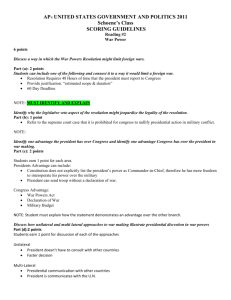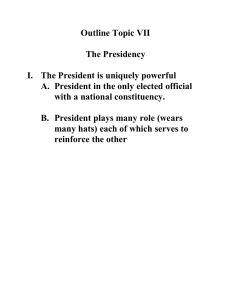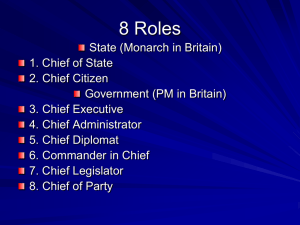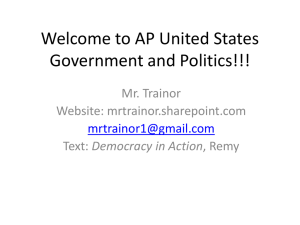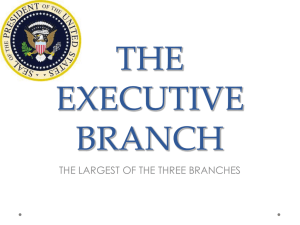Government 2305 Chapter 13 Questions/Prompts 1. Which article of
advertisement
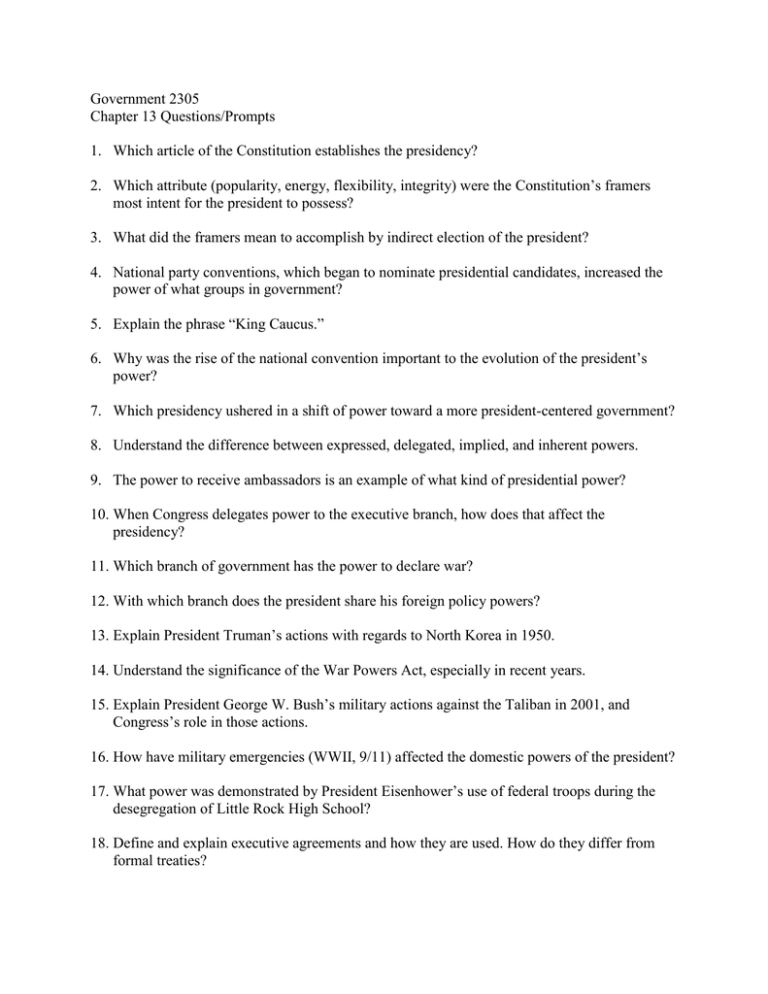
Government 2305 Chapter 13 Questions/Prompts 1. Which article of the Constitution establishes the presidency? 2. Which attribute (popularity, energy, flexibility, integrity) were the Constitution’s framers most intent for the president to possess? 3. What did the framers mean to accomplish by indirect election of the president? 4. National party conventions, which began to nominate presidential candidates, increased the power of what groups in government? 5. Explain the phrase “King Caucus.” 6. Why was the rise of the national convention important to the evolution of the president’s power? 7. Which presidency ushered in a shift of power toward a more president-centered government? 8. Understand the difference between expressed, delegated, implied, and inherent powers. 9. The power to receive ambassadors is an example of what kind of presidential power? 10. When Congress delegates power to the executive branch, how does that affect the presidency? 11. Which branch of government has the power to declare war? 12. With which branch does the president share his foreign policy powers? 13. Explain President Truman’s actions with regards to North Korea in 1950. 14. Understand the significance of the War Powers Act, especially in recent years. 15. Explain President George W. Bush’s military actions against the Taliban in 2001, and Congress’s role in those actions. 16. How have military emergencies (WWII, 9/11) affected the domestic powers of the president? 17. What power was demonstrated by President Eisenhower’s use of federal troops during the desegregation of Little Rock High School? 18. Define and explain executive agreements and how they are used. How do they differ from formal treaties? 19. Why is the president’s State of the Union address important? 20. What is required of Congress to override a presidential veto? 21. Explain Nixon’s use of executive privilege. 22. Explain the history of presidential vetoes in the U. S. Do all presidents use the veto power in about the same manner? 23. What is ‘legislative initiative’? 24. What is an executive order? What agency was created by an executive order in 1970? 25. Explain how executive agencies implement legislation. 26. What factors have caused an increase in the president’s delegated powers? 27. What explains Congress’s tendency in recent years to give executive agencies fewer clear guidelines for implementing laws? 28. Define and explain the duties of the executive Cabinet. 29. What is the White House staff? 30. What is the term for the informal group of advisers to the president? 31. What is the National Security Council? 32. What is the EOP, and who established it? 33. What is the OMB and the CEA? Where, organizationally, do they fit in the executive branch? 34. What is the primary constitutional task of the vice president, besides succeeding the president in case of death, resignation, or incapacitation? 35. After the president and vice president, which office is next in the line of succession? 36. What important roles does the first lady play? 37. Which first lady was the first to seek and win public office on her own? 38. What significant initiative was set forth during the 1960s by President Lyndon Johnson? 39. According to the text, what are the three most common ways for a president to expand his base of power? 40. When are the president’s partisan ties most important? 41. Why was it considered shocking when, after the Civil War, Andrew Johnson made a series of speeches seeking public support for his Reconstruction policies? 42. The technique of popular mobilization dates back to which president? 43. In what ways did Franklin Roosevelt forge a link between the executive office and the public? 44. Explain the origin and function of the White House Communications Office. 45. What is the general tendency of a president’s popularity? 46. What is the significance of the expansion of the EOP, the development of regulatory review, and the use of executive orders? 47. What happened when Harry Truman seized control of the nation’s steel mills during the Korean War? 48. What is a signing statement? 49. According to political scientist Terry Moe, why does Congress suffer from a collectiveaction problem in the face of presidential power? 50. According to separation of powers expert Louis Fisher, the powers of Congress have declined dramatically in which of the following areas? 51. When was the last time that Congress exercised its constitutional power to declare war? 52. The decline of voting and political participation by Americans has what effects? 53. What did the Constitution’s framers believe would be Congress’s greatest prerogative? 54. Which president began the era of greater presidential control over the budgeting process? The test will be Tuesday, Dec. 17th. It will cover only Chapter 13.

